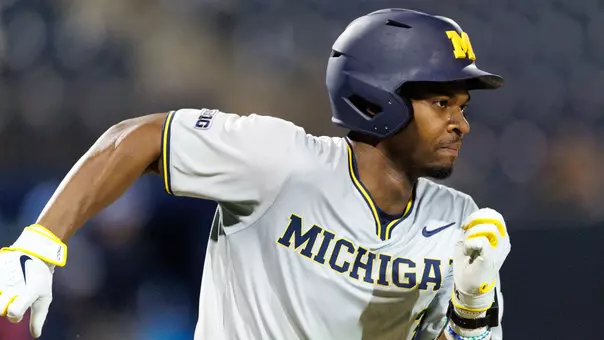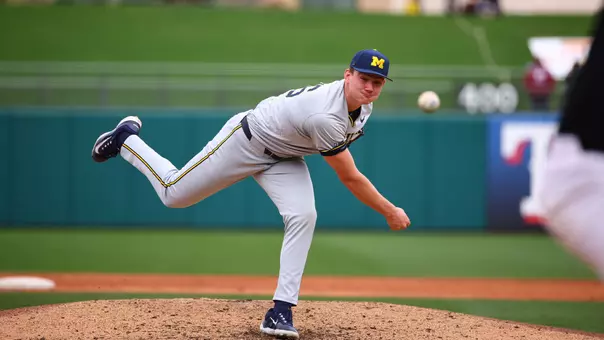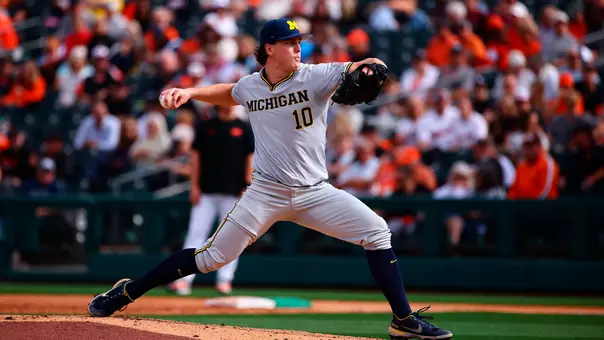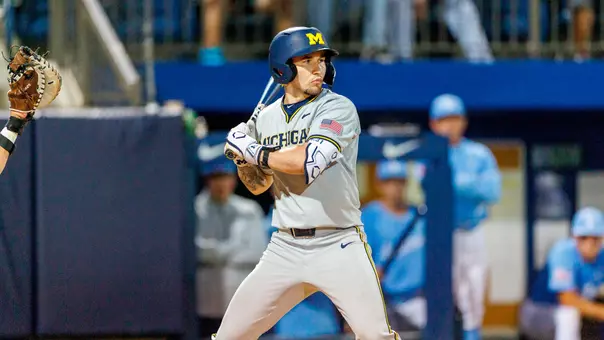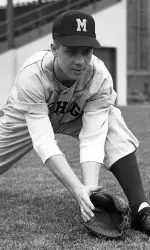
Future Friday: Q&A with Bill Mogk
10/30/2015 12:00:00 AM | Baseball
Oct. 30, 2015

Bill Mogk (center) receives a trophy from Ann Arbor businessman Harold Klies as U-M coach Ray Fisher looks on.
As a member of Michigan's first College World Series championship team, baseball alumnus Bill Mogk has served the University of Michigan since he first stepped foot on campus 65 years ago. A native of Detroit, Mogk opted to attend U-M and play baseball as a Wolverine rather than signing with a professional Major League Baseball team. His leadership role as a captain both on and off the field helped to guide Michigan to its first College World Series title in 1953.
Mogk graduated in 1954 with a degree in history. After his playing career ended, he served the Detroit community as a teacher, coach and principal. He was inducted into the Michigan Hall of Honor in 2002 and still enjoys connecting with current players and alumni to this day.
Q. Let's start at the beginning. When did you first begin playing baseball and how did that come about?
A. I was raised in Detroit during the Great Depression and WWII. It was a time when all life centered on the local neighborhood. At that time, Detroit had a second-to-none Department of Parks and Recreation. Our home was across the street from a Detroit playground which was open from 1 p.m. to dark every weekday and provided bats and balls for softball. About a mile away was another facility open from 9 a.m. until noon every day with the only activity being baseball. In warm weather, I could play baseball from 9 a.m. until noon and then go the playground and play softball from 1 p.m. until dark. Most of the boys were older and I had to improve my skills in order to play in the games. It was at the baseball facility that a manager of a team in the first rung of official Detroit League play saw me and asked me to play for him the next year. That was in 1945 and the beginning of my baseball career began in 1946.
Q. Why did you choose the University of Michigan to further your education and play baseball as a collegiate athlete?

Bill Mogk
A. My skills improved each year as I moved "up the ladder" of leagues and competition. The teams I played on won city championships each year -- the Sandlot championships were in 1946 and '48 and high school championships in 1947 and '49. Major league scouts saw me and our teams and started talking to me. At the same time, a representative of U-M took me to a U-M baseball game where Coach (Ray) Fisher offered me a tuition/books scholarship if I "made the team". Before I entered U-M and after an all-star game in Briggs Stadium (a.k.a. Tiger Stadium), I was selected to represent Detroit in an all-star game in New York. That was in August of '49, and it was the premier showcase of the time. Players were selected from across the U.S. to participate in the game. We played against an all-star team from the New York/New Jersey area. There were no baseball "drafts" back then. Major league scouts would watch you, and if they liked you, they offered you a contract. After this game I was offered contracts from the Tigers, Yankees and White Sox. I talked with the head scout for the Tigers, and he advised me to play at U-M (college baseball was considered to be similar to Class A minor league ball at the time) and continue to play on the Detroit sandlots. He said they knew me and where I was playing and would keep in touch. That cemented my enrolling at U-M.
Q. During the 1952 season, you transitioned from playing second base to first base, and you committed no errors at your first base position, going down in history as the first Wolverine to play errorless for an entire season. What was the transition like from second to first base, and what did it mean to go errorless?
A. It was quite a shock. I had been a third baseman in high school and on the sandlots. That is where the scouts had seen me. I played third base on the freshman team in 1950. In 1951, the third baseman was a senior and I just wanted to make the team as a starter, so second base was fine. When practice started in 1952, I thought I had first choice at playing third base. However, Coach Fisher told me to get a first base glove from the equipment manager as he had a freshman who would play third base (freshmen were made eligible for two years during the Korean War). I started to plead my case and soon realized if I were to be in the starting lineup, I had better learn to play first. I got the glove and taught myself how to use it and the footwork need to play the position. For fielding and throwing, I used my knowledge of how to play third base and applied it to first base. My experience at second base helped regarding how the ball would come at me on that side of the infield. Focusing on the simple fundamentals of fielding and throwing got me through the year. I did not know that I had been errorless until the season was over. Then, I was proud of what I did as my focus and self-determination to do well for the sake of the team had paid off.
Q. You helped guide your team to Michigan's first College World Series title. What was that experience like, and what is your favorite memory of that 1953 championship?
A. We were very focused and businesslike as a team. That attitude prevailed as we entered the tournament. Coach Fisher was not one for fanfare or ceremony. We took a bus to Iowa City for an overnight on the way out. Practice was scheduled the next morning at the University of Iowa and then we drove to Omaha, arriving after dark. We had a luncheon with our service club "sponsor" the next day, practiced in the afternoon and prepared for the first game. It was an eight-team, double-elimination tournament. We won the upper bracket by beating Texas and then had a bye. Texas won the lower bracket. We played them, they beat us and we played again for the championship. The championship game was exciting. During the game we had a runner called out for passing another runner. Entering the last inning we were leading 7-4. Quickly, it was 7-5. They had the bases loaded with only one out. Their cleanup hitter was due up and we were using our third pitcher of the inning. The batter struck out and the next one hit a ground ball to me and I stepped on first. We were the champions! The next morning, the bus left for Ann Arbor at 8 a.m. with only some of the team on it. The ones playing summer league ball were already on the way to their teams. We arrived home at 2 a.m. the next day with no fanfare. It wasn't until the 45th anniversary of our win that the University and Athletic Department recognized our achievement.
Q. You were also a team captain for the 1953 title season. What did it mean to help lead a group of young men on the journey to a historic victory?
A. I considered this an honor and with it came responsibility. We bonded well as we were fundamentally baseball sound, didn't want to defeat ourselves, and cared for each other on and off the field. It was important to me to find a way to involve all the players in team functions and their importance in team success. Negativity or criticism was not part of our repertoire. Helpful comments or observations were encouraged and accepted for the good of the team. When Frank Howell had been subjected to racism in Virginia and had his meal served in a paper bag, we all asked for paper bags. When he had to sit in the balcony at the movie, we all sat in the balcony. This was all done without a word mentioned. We just did it. That is the way we were and still are today. At the World Series, I had the additional responsibilities of team manager. Coach Fisher had not brought our manager to the tournament and his duties shifted to me. I felt it my responsibility to keep the team informed and in contact after graduation. My role as team leader has continued. I have been responsible for team reunions at 10, 20, 25, 30, 35, 40 and 45-year anniversaries. After that, we had some help from the baseball office. Coach (Rich) Maloney was the first to embrace and recognize us and now Coach (Erik) Bakich is doing the same. Our ranks are dwindling, but we still had reunions at 50, 55, 59 and 61 years. We are keeping an eye on 65 (2018) and hope some can make it.
Q. After you graduated from Michigan with a degree in history, you went on to become a teacher and coach. Why did you choose that path, and what did you learn the most from that experience?
A. This path was easy. I had a wonderful experience at Detroit Southeastern High School both academically and athletically. When it became clear that I was not going into pro ball, I fell back to the things I loved. The following statement puts my life in perspective: "I had a career in education but baseball was my real life." I am thankful that a principal from Grosse Pointe had seen me play at U-M. He offered me a job, and when he retired, I took over as principal. I learned that kids come in all sizes and shapes, all kinds of talents, and exist in very different life situations. The major thing I learned from teaching 13- to 16-year-olds was you never give up on them. You have to give them the best you've got and treat them with tough love and fairness. Laugh and enjoy them, remember what you were like at that age. These were the same things I learned as a ballplayer. It was like living a dream. As I moved on to counselor and principal, these same values remained. In any function I had in sports or education, I approached the tasks with a teamwork style. My approach was, if I did my job and you did yours, we would have success. I was living the "team" approach much before Bo (Schembechler) made his famous "The Team" slogan. When I retired, I was home for a year as my wife was still teaching. Then, I volunteered to help coach the high school baseball team. That lasted for 10 years. We won the state championship in 2001 on the same date (June 16) that we had won the College World Series in 1953. Three players I coached went on to play for U-M and two signed professional contracts. Many others played college baseball elsewhere.

1953 NCAA Champions -- Front Row (from left): Bruce Haynam, Frank Howell, head coach Ray Fisher, Bill Mogk, Gerald Harrington, Gil Sabuco, Bill Billings. Second Row: Jack Ritter, Richard Leach, Garabed Tadian, Paul Fancher, Robert Woschitz, Jack Corbett, Richard Yirkosky, manager Bob Margolin. Back Row: Dan Cline, Don Eaddy, Marvin Wisniewski, Ray Pavichevich, Paul Lepley.
Q. You were a part of the 2002 Michigan Athletics Hall of Honor induction class. What did that honor mean to you, nearly 50 years after your graduation?
A. That recognition was unexpected and is priceless. I think my first reaction to the announcement letter was disbelief then honor. These were quickly overshadowed by a total feeling of humbleness. I thought about our team and what we accomplished and felt I had done a good job of helping guide us into a real team effort. Even though my stats may not be as extraordinary as most in the Hall, I think my impact as a player at different positions during every inning for the three varsity years were valuable contributions to the program. I have already mentioned how I felt about the responsibility of being captain and how our team has remained loyal and intact over the years.
Q. Would your life be different if you had not attended Michigan as a baseball student-athlete? If so, what do you think life would be like?
A. I would have gone to Wayne State University in Detroit, lived at home and played on the Detroit sandlots. If the opportunity came back, I probably would have taken a fling at pro ball. I really don't think I would have made it as a player, but I honestly do believe I could have been in some organization as a scout, coach or manager. Other than that, I would have finished my teaching degree and probably started teaching and coaching in Detroit. I also umpired for 10 years and might have continued or maybe gone into more officiating while in Detroit.
Q. What does being an alumnus of Michigan, and specifically a baseball alum, mean to you?
A. First of all, I am proud and happy to be a part of these elite groups. I, and our team, feel we have a special relationship with both the University of Michigan and U-M Baseball. We certainly are very proud of what we did and how we represented U-M. Secondly, without being admitted to U-M, nothing like this would have happened for us. We all graduated on time and all were successful in our careers. All of our players have been recognized while wearing our championship rings. To U-M alumni worldwide, it signals a bond and solidifies our special place in the history of U-M as only 17 people made this accomplishment for ourselves and the University.
The Office of Alumni Engagement strives to foster a community, recognize the holistic student-athlete and honor the great Michigan Athletics history. This alumni spotlight illustrates the impact that our alumni are having around the world and how they stay engaged with Michigan.
The 2015-16 academic year marks the 150th anniversary of Michigan Athletics. We invite the University of Michigan family to celebrate the passion that fuels us, rediscover the stories and traditions that unite us, and imagine what the future holds for us. We look forward to celebrating "This Michigan of Ours." To share a memory of Michigan Athletics, please fill out our online form or email goblue150@umich.edu.

